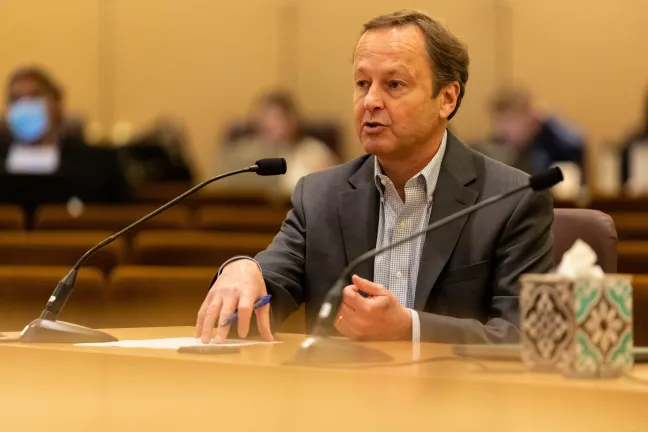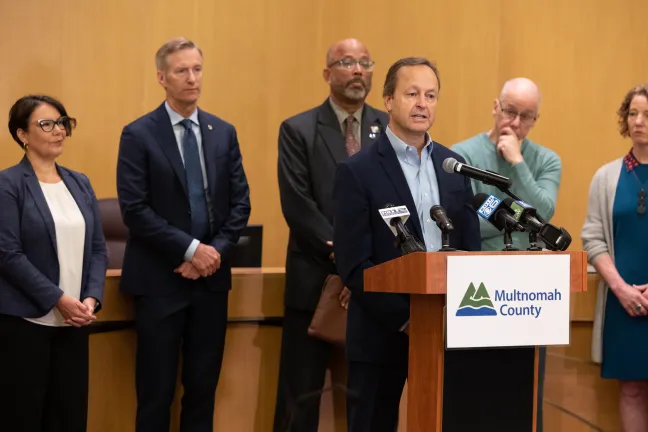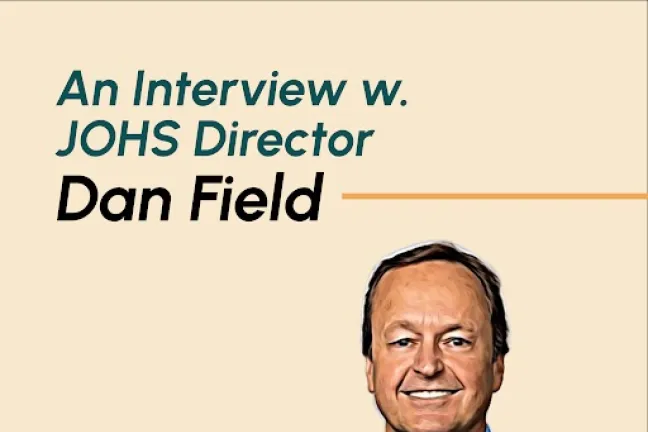Dan Field joined the Joint Office of Homeless Services in late April as its second permanent director since its launch in 2016 — assuming leadership of the department at a time of unprecedented opportunities, collaboration and resources, but also amid unprecedented, and persisting, community challenges in the wake of the COVID-19 pandemic.
Field comes to the Joint Office after 30 years in the healthcare sector, including two decades as a Kaiser Permanente executive. He was hired after an extensive recruitment process, selected in large part due to his experience finding concrete solutions to some of Oregon’s most complex and seemingly intractable problems, through negotiation and a commitment to building new partnerships.
After his first week on the job, Field answered questions about his background and his priorities for the Joint Office.
This interview has been lightly edited for brevity and clarity.
Can you tell us a little bit about your background and how it led you to accept the job of leading the Joint Office?
I actually started my career in public service. I've been in the private sector for about 30 years, but 30 years ago I started as an intern at the state Legislature, and that was my first professional exposure to being in the public sector. And I always had it in my head that I wanted to go back to that.
So in between those 30 years, I went to law school and then I went into the private sector in healthcare. I've been in the healthcare sector for all that time, but staying close to the public sector, staying close to elected officials. In the arc of my career, it felt like a really natural move to come back and lean in with everybody at Multnomah County and the City of Portland.
When something comes to you and it's the right moment to make the move, you've got to do it.
How do you see homeless services tying into your work in healthcare?
My professional journey in housing and homelessness started in 2016, when all the health systems came together and made a really large investment, with Central City Concern, and we built the Blackburn Center. And it was the first time, I think, in our community that the health system leaders and the housing and homeless leaders had worked together to build a solution.
After we finished that financing, a group of us got together with Ed Blackburn [the former CEO of Central City Concern] and said, “Let’s not let the work stop with this one-time investment.” So we created something called the Regional Supportive Housing Impact Fund. And we said, “Where do we go from here?”
We continued to meet and work, and we eventually partnered with Health Share of Oregon to launch something called Metro 300. This was funded primarily by Kaiser Permanente, but other organizations as well. The goal was to house 300 medically vulnerable seniors in partnership with Health Share and the Joint Office Homeless Services and the other two counties as well. We housed over 400 seniors very successfully.
That really led me directly to this opportunity, to realize that I can have the chance to have a direct impact on our housing strategy in this community.
How are housing and healthcare connected?
We really need to expand our definition of health. We have to think of health expansively, and we know that the conditions for health exist in our communities, not just in a doctor's office, not just in a pill bottle.
Once you start to think about health more broadly, you realize that some of the most important investments we can make are in housing.
The partnership we're going to have with Health Share, for example, is really about thinking about an individual and a community’s health more holistically — not getting stuck in the silos of funding and and professional titles and designations, but instead starting with the individual at the center and saying, “What does that individual need?” They may need housing and health support to work really closely together to get them stabilized. They may need us to work together in ways that we haven't always worked together before.
What I hear from healthcare staff is they understand that housing is the most critical need, maybe even more than the medical needs that a person's presenting with. But they don't know what the pathways are. They don't know whom to call. They don't know what options are available for that person — motel vouchers, shelters, other housing opportunities.
And we don't want our healthcare personnel to become housing experts. We want to be able to partner with them and allow them to make some direct connections for that person who has housing needs.
As I came into this role, people said, “Well, he's not a housing professional. He came out of healthcare.” But it's actually a very natural transition for me, once you start to broaden your understanding of what it means to be healthy. From that point of view, it makes a lot of sense that somebody in healthcare would want to come in and work in housing and homeless services.
How are you approaching your role leading the Joint Office? What's your vision for the office?
I envision a Joint Office that is really working collaboratively with City leaders, County leaders and community leaders — and working together around a unified strategy.
Just in the last couple of months, we've seen some great alignment. Our new County Chair [Jessica Vega Pederson] has really declared her priorities and her direction, and I'm here to support that.
So, for example, she's teed up a major initiative called Housing Multnomah Now, and we're going to work on that in the context of the Governor's call to action around Oregon All In.
We have the Supportive Housing Services Measure, which we continue to implement. I want to make sure that we're deploying those dollars effectively and in the right places to have an impact on our community.
Can you talk more about why collaboration is important to this work?
It all starts with the individual. If you put somebody at the center of your work and you recognize them as a holistic person with many complex needs, it then becomes really difficult to step back and say, “I'm only here for your housing needs. I'm only here for your health care needs. I'm only here to help you with your substance use disorder.” You just can't do that any longer once you start to see somebody as a whole person.
So that means it's up to us, who are surrounding that person, to work together differently. We’ve got to challenge ourselves to work differently and to look across funding lines, organizational lines and other lines that divide us. We've got to look across those and ask, “How do we serve this individual more flexibly, more holistically, in a really integrated fashion?” So that it’s not incumbent on the individual to go knock on the housing door, go knock on the healthcare door, go knock on the criminal justice door. It's incumbent on us to create a door where that person can walk through and we'll be there to support them.
Equity and inclusion are key values for the Joint Office and Multnomah County. How does equity fit into your work and your vision for the Joint Office?
I've been very pleased to arrive here and see the office’s longstanding emphasis on equity. I will tell you that one of the the bittersweet moments of leaving my former job was I was really leaning in on some equity work there. The organization I left is getting ready to start up a Center for Black Health and Wellness, and it was hard for me to leave before the doors actually opened. I'm rooting for my former colleagues to get that up and running, and I will support them from Multnomah County to get that done. But that gives you a sense of the energy that I bring to this work.
We know communities of color are disproportionately impacted by housing insecurity, and that means our efforts to address it have to be disproportionately focused on those same vulnerable communities.
You can't do the same thing for everybody and expect the same outcome. I think the culture here at Multnomah County is very supportive of that type of approach to our work. And I was pleased to find that when I got here.
What do you do in your (limited) free time? What do you like to do for fun?
I've lived in Portland off and on for 43 years. I came to Oregon when I was 17 years old. I love this community. And I'm here for the reason that many of us are here — I love the outdoors, and every weekend finds me hiking somewhere: Tryon Creek, Forest Park, the Gorge. I love to ski. I love to run.
I am a late adopter — with technology in particular. But we, my wife and I, were late adopters during the pandemic, and I mean that literally. We adopted a rescue dog and we waited until the pandemic was at the very end. So we have an eight-month-old puppy. I’d like to say we're training her, but the reality is she's training us. At my ripe old age, I'm learning how to behave a bit differently around a puppy.
Hear more of this conversation in a special episode of "Out of the Streets of Portland," a podcast by the Joint Office of Homeless Services



